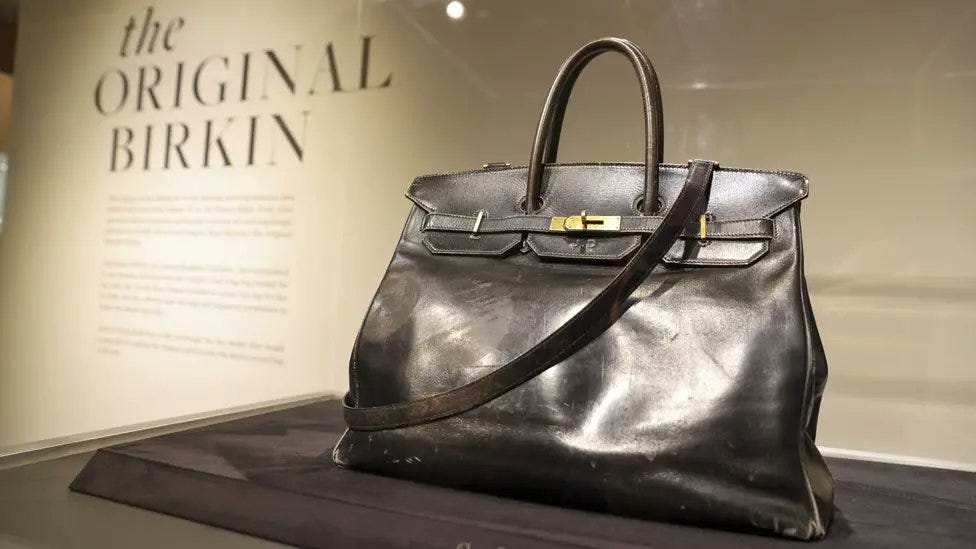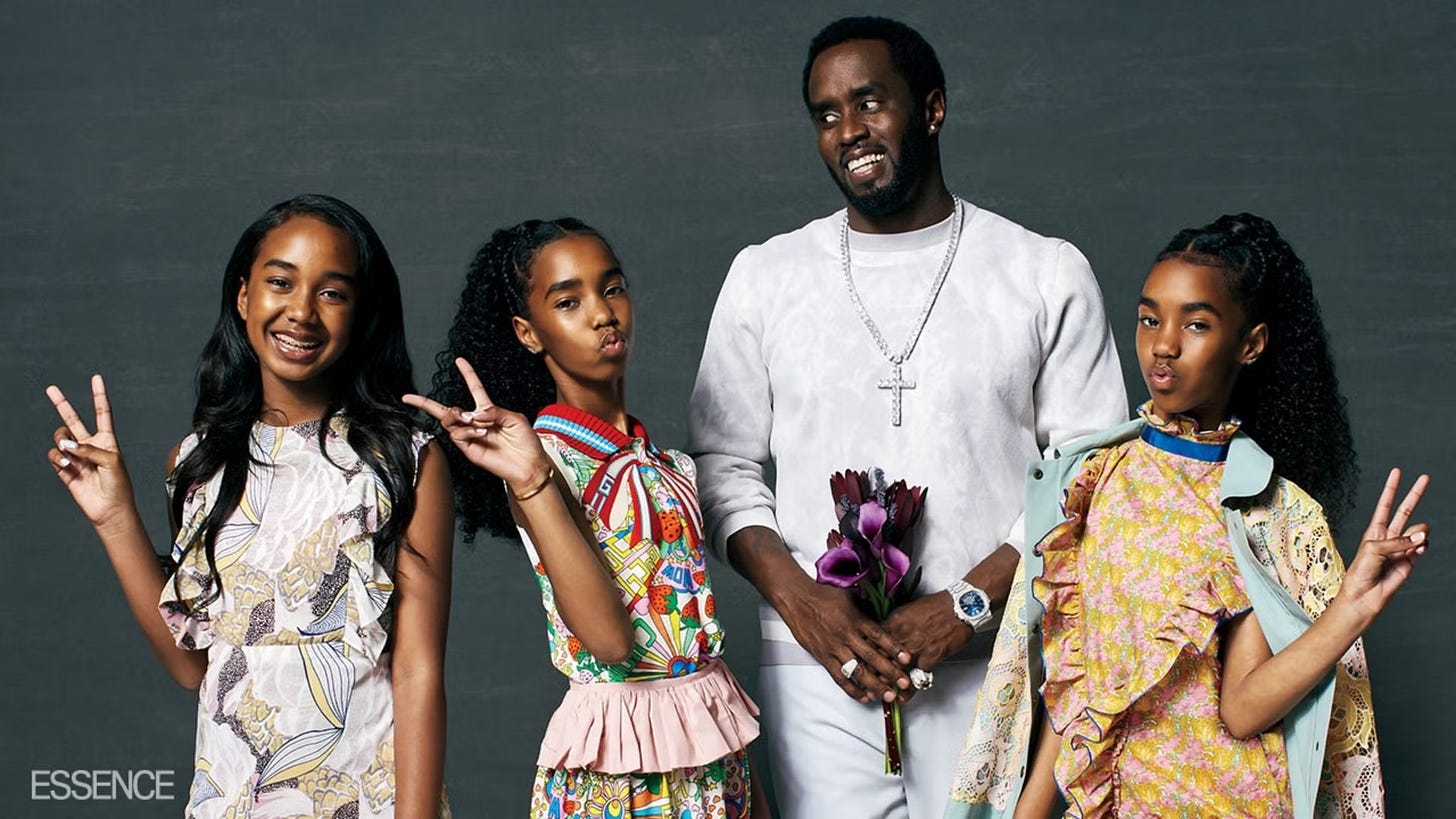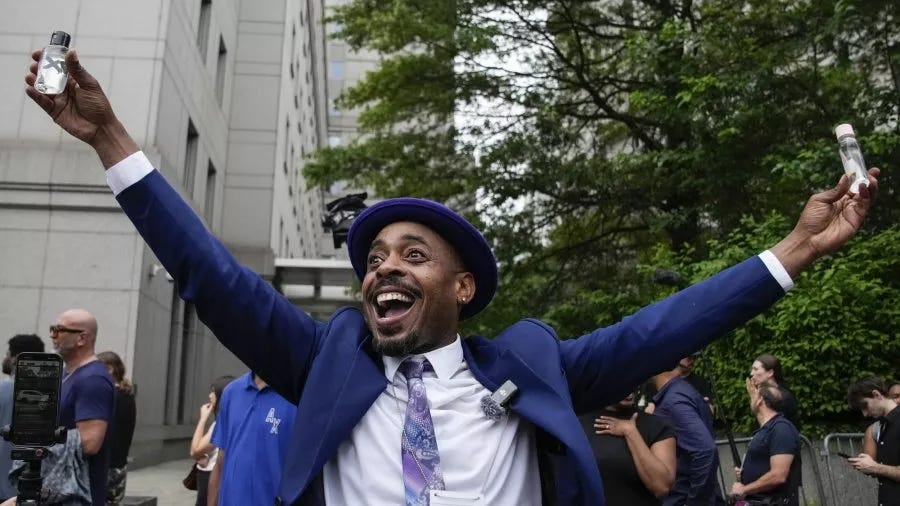Week in review: Bieber's stuck in 2012 (complimentary)
We talk Bieber, Birkin, Cierra, Superman, & Diddy
Hi hi! It’s me, Olivia. Just popping in after a couple weeks of travel to say: Fan Mail is BACK!
A few quick updates:
I’ll now be posting one big Week in Review at the end of each week, packed with the hottest pop culture stories (and my unfiltered takes).
Reality TV recaps (especially Bravo) will be selective, not exhaustive — think finales, drama bombs, or anything too juicy to ignore. We’re in a bit of a Bravo drought anyway.
READ THIS (Sunday digest) stays! It’ll feature the smartest marketing moves, best new songs, and stories that actually made me stop scrolling.
Let me know how this feels. I’m always open to feedback. Excited to be back in your inbox 💌
Bieber’s stuck in 2012 (complimentary)
On Friday (today), Justin Bieber released SWAG, his seventh studio album, first in four years, and cringiest titled to date. (Seriously, how did we go from Believe, Purpose, and Justice to… Swag? Did a 2012 hashtag ghostwrite this?) Billed as a return to “vulnerability and rawness”, the 21-track project is less of a pop album and more of a self-produced group text between Bieber and whoever’s still rooting for him. It’s layered with all the debris of his public life: marriage rumors, mental health struggles, fatherhood, financial stress, religious philosophy, and meme-worthy catchphrases turned skits.
It’s also his first major creative statement since severing ties with longtime manager Scooter Braun, settling a reported multi-million-dollar debt, and stepping into a new public role as dad to 10-month-old Jack Blues.
So, yeah. It’s a lot. Sonically and emotionally.
SWAG trades Bieber’s polished pop-R&B of Justice for a lo-fi, analog-textured sound that leans into sophisti-pop (think, Sade) cloud rap (think, early ASAP Rocky) and post-Tumblr soul (think, Frank Ocean). It’s full of guitars, drums, and spacious mixes that feel designed for grainy Instagram Stories and late-night voice notes. He worked with experimental-minded producers like Mk.gee and Carter Lang (known for work with SZA and Dijon), alongside collaborators like Sexyy Red, Gunna, Dijon, and Lil B, who lend the record a kind of cosmic weirdness that has little interest in chasing chart performance.
Tracks like “Daisies,” “First Place,” and “Go Baby” lean into stripped-down acoustics and distorted percussion, building sonic bridges between alt-pop and the messier ends of R&B. The emotional center, though, is Walking Away, a melancholic track that all but confirms his rocky stretch with wife Hailey Bieber—before re-committing to her in the chorus.
“Girl, we better stop before we say some s–t / We've been testing our patience / I think we better off if we just take a break…”
“Baby, I ain’t walking away / You were my diamond / Gave you a ring / I made you a promise.”
It’s one of several songs that reference their relationship, which has been the subject of online speculation for over a year. While SWAG doesn’t offer definitive answers, it does what Bieber often does best: dramatize personal chaos into soft declarations of devotion. Other tracks, like Therapy Session and Zuma House, flirt with lo-fi folk balladry and reflect vulnerability. On 405, he sings like a man who’s been alone in his car a little too long with his thoughts.
There are also…skits. Comedian Druski appears on three separate tracks as Bieber’s pseudo-therapist, dropping lines like,
“Your skin white, but your soul Black, Justin…you gotta smoke these Black & Milds with me, bro.”
He obviously had add in Standing on Business, where Bieber turns his viral paparazzi outburst (“I’m a dad. I’m a husband. You’re not getting it. I’m standing on business”) into a meta-musical punchline. Obviously.
And then there’s Dadz Love, a track featuring a warped Lil B monologue and Bieber chanting a phrase that may or may not be “that’s love,” “dad’s love,” or “God’s love.” Given Bieber’s long, complicated history with Scooter Braun, Dadz Love feels like his way of taking back control of his music, his voice, and maybe even his identity. Earlier this year, a TMZ documentary alleged Bieber was near “financial collapse” in 2022, forced to sell his music catalog for $200M to stay afloat after canceling his Justice tour. Braun—who allegedly fronted Bieber $26 million through his Hybe company—was paid back this spring, but not before speculation about their now-defunct working relationship dominated music business headlines.
My take? SWAG is probably not a great album. But it’s a good one. The music is fun, the writing is earnest, and the bops (@Daisies) are bopping. The production is pretty. The lyrics are sometimes strong. The skits are awkward and deranged. And yet, there’s a weird charm to the whole thing. This is Bieber unplugged—not in the MTV acoustic sense, but in the extremely online, half-healed, emotionally-leaking-on-main sense. If Bieber-fever is back, I’m listening. But I also think he should maybe call a real therapist. Soon.
Holding space for these types of words
There are certain things Love Island USA has always promised: slow-burn love triangles, neon bikinis, British-accented narration. But Season 7 delivered something else entirely—a referendum on accountability in the influencer age. And the most dramatic scenes haven’t aired on Peacock, they’ve played out on TikTok, Reddit, and Instagram, in the spaces where digital footprints become front-page news.
On Sunday night, Love Island USA (very quietly) announced that contestant Cierra Ortega had “left the villa due to a personal situation.” No details, no goodbye, just a sudden exit mid-episode and a cut to (the very handsome) Nic Vansteenberghe—her onscreen partner—being declared “officially single.” (Thankfully, he did not have a giant zit on his face for the viral moment).
But viewers already knew the reason. Days earlier, old social media posts had surfaced in which Ortega, 25, used a racial slur—specifically an anti-Asian term referencing her eye shape—on three separate occasions between 2015 and 2023. A petition demanding her removal quickly racked up over 17,000 signatures, and pressure mounted across Reddit threads and Instagram comments until producers made their decision.
This week, Ortega reemerged in the States and posted a four-minute video to Instagram in a sweater that said “Empathy.”
“This is not an apology video,” she said, seated on the floor, “this is an accountability video.” She described herself as “naïve,” “embarrassed,” and “grateful” to the person who educated her after the post resurfaced last year. She said she deleted the post immediately and never used the word again. “The lesson was learned,” she said. “It was a true learning moment for me.”
But the public scrutiny has not stopped at Ortega. In her video, she revealed that her family had received death threats and that someone had even called ICE on them. “My family doesn’t feel safe in their own home,” she said, visibly shaken. “There’s no need to fight hate with hate… that’s not justice.”
Earlier in the week, Ortega’s parents released a joint statement on her Instagram story calling it “one of the most painful weeks of our lives.” While acknowledging the harm of the original posts and emphasizing that “accountability matters,” they asked the public to stop targeting their daughter’s loved ones. “We’re not here to justify or ignore what’s surfaced,” they wrote. “But what’s happening online right now has gone far beyond that.”
This isn’t the first time Love Island USA has removed a contestant this season. Ortega is the second cast member ousted in Season 7 over racist language. The first, Yulissa Escobar, was booted from the villa just days into filming after fans uncovered a podcast clip in which she repeatedly used the N-word. Escobar later issued a TikTok apology, admitting she hadn’t understood “the weight, history, or pain” of the word (yeah, okay, sure).
In a different era, producers might have been able to control the optics. But this season’s cast (mostly between the ages of 21 and 27) is made up almost entirely of Gen Z contestants, the first cohort of reality TV stars whose adolescence and early adulthood unfolded entirely online. Their lives have been documented in real-time, across Snapchat, Instagram captions, archived tweets, and TikToks with regrettable audio. And unlike the show’s earlier seasons, Love Island USA now competes not just with traditional media outlets but with TikTok explainers, fan-edited receipts, and Change.org petitions that can build traction faster than a network can write a press release. The result is a two-track show: what airs on TV, and what plays out online.
What Love Island USA is learning in real-time—and what many other reality franchises are beginning to grapple with—is that the old rules of scandal management no longer apply. Viewers aren’t just fans anymore; they’re watchdogs, historians, and critics. And they don’t want resolution packaged neatly into a confessional booth. They want receipts, reform, and the power to decide when someone deserves forgiveness.
And yet the line between accountability and retribution is getting harder to parse. The same platforms used to advocate for justice are also being weaponized for harassment. As both Ortega and Escobar have noted, the attention doesn’t fade once filming ends…it metastasizes. Escobar, speaking out in defense of Ortega this week, said she was “scared to come home” after her own removal and feared something might happen to her.
This duality (the desire for consequence and the caution against cruelty) has become the signature tension of the accountability era. And I’m not saying it’s not bad TV. It’s just no longer TV at all.
Would you buy a $10 million handbag?
Some people leave behind a legacy. Jane Birkin left behind a bag. And not just any bag…the bag. The prototype. The O.G. of all Hermès Birkins. And this week, it sold at Sotheby’s auction for a record-breaking $10 million, proving once and for all that nothing says luxury quite like a beat-up tote once sketched on an airplane vomit bag.
Yes, you read that correctly: the world’s most expensive handbag began its life in coach class (okay, probably business), scrawled out mid-flight after Birkin’s wicker basket handbag spilled onto Hermès CEO Jean-Louis Dumas. Inspired by maternal chaos, they created what would become one of the most iconic fashion items on earth.
The original—her daily companion from 1985 to 1994—wasn’t some pristine trophy. She wore it to death, covered it in UNICEF stickers, clipped on silver nail clippers (function over form!), and let it collect the kind of wear-and-tear that would make a RealReal authenticator weep.
That’s what made the final sale so deliciously ironic. Despite being scuffed, stained, and visibly used, the bag fetched more than any croc-studded, diamond-strewn version before it (including the ultra-rare Himalaya Birkin that once sold for $450K!!!) It wasn’t perfection that made this Birkin historic. It was provenance and personality. It was, not to be corny, so Jane.
For context: new Birkins can retail between $10K and $100K, depending on material, color, and how deep your relationship with your Hermès sales associate runs. But even at their shiniest, they’ve become more than accessories—they’re alternative investments, financial assets, a visual flex for the rich who want you to know they’re rich. (Though don’t worry, Walmart now sells a pretty convincing dupe for $89.)
The buyer of Jane’s Birkin? A private Japanese collector who won after a 10-minute bidding war. The bag itself last sold 25 years ago, after Birkin auctioned it off to support AIDS research. Since then, it’s floated through museums and collectors’ hands before hitting Sotheby’s this month as part of a luxury fashion sale also featuring Alexander McQueen and Christian Dior designs. Sotheby’s called it “an important milestone.”
In a 2020 interview, Birkin joked, “Bless me, when I’m dead… [people] will possibly only talk about the bag.” And reader, she was right. Rest in peace to Jane, and to any attempt at subtle wealth. The bag that once held diapers, notebooks, and god knows what else just sold for the price of a Manhattan brownstone.
The new Superman’s making people hot and bothered
It’s a bird, it’s a plane, it’s… Dean Cain having a meltdown on TMZ.
The former Lois & Clark star, best known for playing Superman in the ‘90s and currently known for yelling at clouds (and occasionally co-hosting Fox & Friends), has declared that James Gunn’s new Superman movie is—you guessed it—too “woke.” Cain, now 58 and still very publicly aligned with Trump-era conservatism, accused Gunn of injecting politics into the franchise, saying:
“How woke is Hollywood going to make this character?”
Then, for reasons no one asked for, he pivoted to Snow White, Somalia, and immigration policy like it was a bad Facebook rant your uncle posted during Thanksgiving dinner.
Cain’s main issue? Gunn’s recent comments in The Times that Superman is, at his core:
“a story of America… an immigrant that came from other places and populated the country,” and, more importantly, a symbol of “basic human kindness.”
Radical stuff!
Cain didn’t exactly disagree that Superman is an immigrant (he is, famously, from Krypton), but he took offense at the political framing and argued that the U.S. “can’t have everybody” or “society will fail,” invoking the kind of dog-whistle rhetoric that makes you want to hand him a civics textbook and a calming tea.
Fox News was quick to pile on. Hosts called the film “Superwoke,” joked that Superman now “fights for truth, justice, and your preferred pronouns,” and claimed that MS-13 was “written on his cape.” LOL.
But here’s the twist: Superman, the actual movie, is… good. Critics are calling it vibrant, thoughtful, emotionally textured, and a reboot that finally treats the Man of Steel like a full character, not just a CGI battering ram. David Corenswet’s (sexy) Superman is bruised, sincere, and emotionally complex. Rachel Brosnahan’s Lois Lane holds him accountable. Lex Luthor is a fascist tech bro with government ties. There are holograms. Interdimensional prisons. An adorable-but-reckless dog. It’s giving comic-book camp with actual stakes. Gunn’s thesis, both onscreen and off, is simple: maybe the most radical thing Superman can be in 2025 is… kind.
The film is performing well, audiences are responding positively, and the broader DC reboot appears to have some life in it. Gunn has succeeded in doing the impossible: making Superman feel relevant again. The plot is bonkers, sure, but the heart of it? It’s punk rock optimism…exactly the kind of thing that drives right-wing pundits wild and sells tickets.
Diddy’s daughters get into fashion
D’Lila and Jessie Combs, 18-year-old twin daughters of Sean “Diddy” Combs and the late Kim Porter, just announced the launch of their very own fashion label, 12TWINTY1. The name is a nod to their birthday (December 21), and the brand is positioned as something personal: “more than just fashion,” as the girls said in their launch video. According to them, the brand’s symbolism runs deep: the number one represents leadership and new beginnings, while the number two represents love and connection. Together, they said, the numbers represent who they are.
But who they are—and who their father is—can’t be separated right now. That’s what makes this announcement feel not just mistimed, but wildly out of touch.
The twins’ fashion debut comes just days after their father was found guilty of transportation for prostitution in a federal trial, but acquitted on the far more serious charges of racketeering and sex trafficking. The verdict landed like a gut punch. This was a closely watched case, with disturbing testimony from over 30 witnesses, including ex-girlfriend Cassie Ventura, who detailed years of alleged violence, coercion, and humiliation. There was video evidence. There were bruises. There were patterns. And still, the jury didn’t convict.
Across social media, the reaction wasn’t just disappointment, it was rage. “Sad, but not surprised” filled group chats like a collective sigh, followed quickly by “how the hell are we still here in 2025?” For many women, it felt like yet another reminder that even with receipts, even with courage, even with 34 witnesses on your side: accountability for powerful men remains the rarest luxury item of all.
The optics of launching a luxury fashion brand in the middle of a modern-day misogyny reckoning—led in part by your dad—is, at best, unfortunate. At worst, it’s a glaring example of just how normalized and insulated celebrity culture can be from public outrage. While survivors shared their stories and court reporters detailed accounts of assault, the Combs twins were teasing brand values and zodiac-coded numerology. It’s giving: Gen Z girlboss energy trapped inside a crisis PR vacuum.
Yes, the twins are young. And yes, they’re allowed to build careers independent of their father’s legacy. But in a year when Dior still proudly backs Johnny Depp, and violent porn passes as mainstream content, and juries still struggle to understand consent, watching a new Combs brand enter the luxury market feels like more than just awkward timing, it feels like an eerie symptom of the same cultural machinery that lets men stay powerful while the women around them do the damage control.
After all, this isn’t just about a fashion line. It’s about what it means to build something in a world where accountability is still optional for powerful men (but expected from everyone else).















Hi! Out of curiosity, do you ever cover / write about little indie films? (I have one coming out)